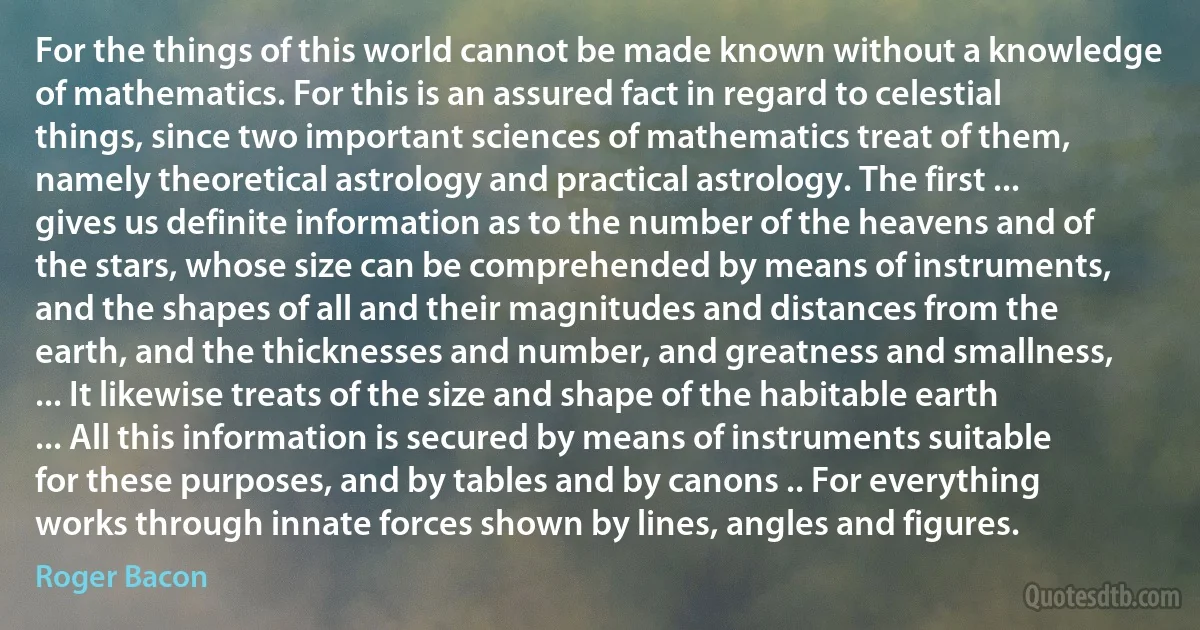
For the things of this world cannot be made known without a knowledge of mathematics. For this is an assured fact in regard to celestial things, since two important sciences of mathematics treat of them, namely theoretical astrology and practical astrology. The first ... gives us definite information as to the number of the heavens and of the stars, whose size can be comprehended by means of instruments, and the shapes of all and their magnitudes and distances from the earth, and the thicknesses and number, and greatness and smallness, ... It likewise treats of the size and shape of the habitable earth ... All this information is secured by means of instruments suitable for these purposes, and by tables and by canons .. For everything works through innate forces shown by lines, angles and figures.
Roger BaconRelated topics
astrology celestial definite earth everything gives greatness known knowledge likewise mathematics number show size smallness treat world means works things heavens sciences starsRelated quotes
For what advantage is it, that the world enjoys profound peace, if thou art at war with thyself? This then is the peace we should keep. If we have it, nothing from without will be able to harm us. And to this end the public peace contributes no little: whence it is said, ‘That we may lead a quiet and peaceable life.' But if any one is disturbed when there is quiet, he is a miserable creature. Seest thou that He speaks of this peace which I call the third (inner, ed.) kind? Therefore when he has said, ‘that we may lead a quiet and peaceable life,' he does not stop there, but adds ‘in all godliness and honesty.' But we cannot live in godliness and honesty, unless that peace be established. For when curious reasonings disturb our faith, what peace is there? or when spirits of uncleanness, what peace is there?

John Chrysostom
Don't forget that God sees you and watches you when you are in pain; He perceives even the beating of your heart. Consequently, He will not leave you without consolation and His fatherly protection. Naturally, the saints rejoiced in their afflictions; as for us, let us at least manage to accept affliction or pain patiently.
My child, pray within your heart, and the name of Jesus will become for you a comforting balm so that you can bear this trial of yours in a way which benefits you. You will greatly benefit from this trial if you submit yourself to it patiently. So again I say to you, with the almighty armor of prayer continually approach the omnipotent Lord more often, and you will come to know how He wondrously lifts the burden of pain and marvellously gives rest to sufferers.

Ephraim of Arizona
Modern man ... when he looks at his daily newspaper ... sees the events of the day refracted through a medium which colors them as effectively as the cosmology of the medieval scientist determined his view of the starry heavens. The newspaper is a man-made cosmos of the world of events around us at the time. For the average reader it is a construct with a set of significances which he no more thinks of examining than did his pious forbear of the thirteenth century-whom he pities for sitting in medieval darkness-think of questioning the cosmology. This modern man, too, lives under a dome, whose theoretical aspect has been made to harmonize with a materialistic conception of the world. And he employs its conjunctions and oppositions to explain the occurrences of his time with all the confidence of the now supplanted discipline of astrology.

Richard Weaver
Lincoln had a wonderful faculty for understanding the topography of a country, and he was quite familiar with the one in which the army was about to operate; he carried a small chart in his pocket, on which were marked all the rivers and hills about Richmond, with the city itself, and the different points where General Lee had his forces posted, the lines of defense, and, in fact, all the information that a general of an army wanted. During our rides which were always within the lines he would stop and spread out his chart on his knees and point out to me what he would do if he were the general commanding, taking good care, at the same time, never to interfere in any way with General Grant, whom, I rather think, he considered the better strategist of the two.

David Dixon Porter
As the natural sciences have developed to encompass increasingly complex systems, scientific rationality has become ever more statistical, or probabilistic. The deterministic classical mechanics of the enlightenment was revolutionized by the near-equilibrium statistical mechanics of late 19th century atomists, by quantum mechanics in the early 20th century, and by the far-from-equilibrium complexity theorists of the later 20th century. Mathematical neo-Darwinism, information theory, and quantitative social sciences compounded the trend. Forces, objects, and natural types were progressively dissolved into statistical distributions: heterogeneous clouds, entropy deviations, wave functions, gene frequencies, noise-signal ratios and redundancies, dissipative structures, and complex systems at the edge of chaos.

Nick Land
